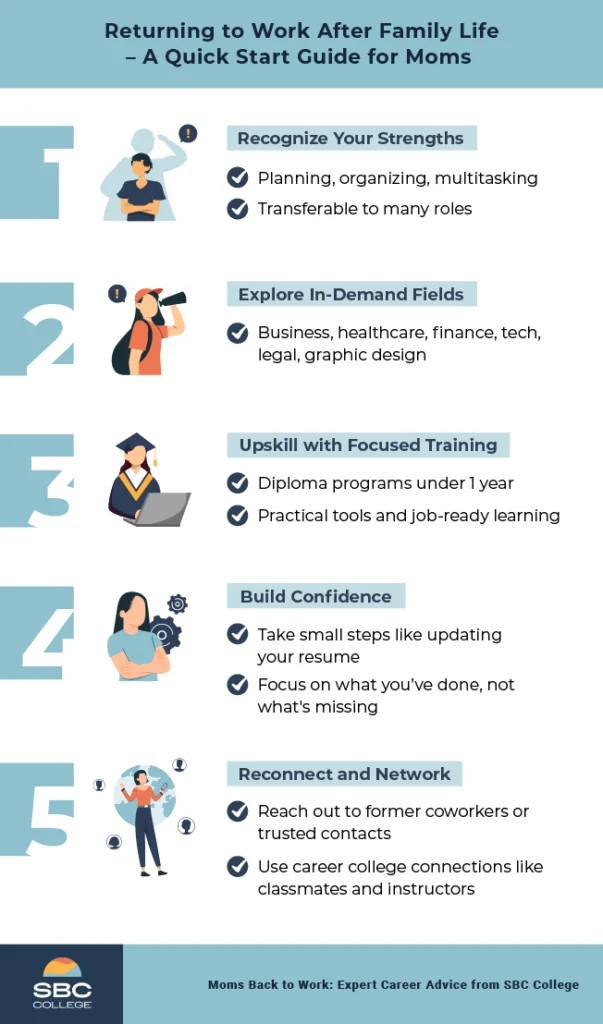Table of Contents
After spending time focused on your family, re-entering the labour market can feel unfamiliar. You may be excited, nervous, hopeful, all at once. This is a big transition and knowing what to expect can make the process feel more manageable.
This article offers career advice for women returning to work. Whether you’re stepping back into a familiar field or starting something new, you’ll find ideas to help you plan with more direction and less pressure.
Listen to: Moms Back to Work: Expert Career Advice from SBC College
Addressing the Challenges
Returning to the workforce often brings a shift in routine. Some parts of the day may feel satisfying; others may take time to adjust. Before taking the next step, it helps to pause and reflect.
Begin by asking what matters to you right now. That could be building financial stability, reconnecting with your professional identity, or creating a routine that works for your family. Once you’re clear on that, it becomes easier to focus your time and energy on what you want.
It is also natural to have questions about how time away will be viewed. While career break concerns and questions about resume gaps are common, remember that they do not erase the value of your experience.
As a parent, you use skills like focus, decision-making, and adaptability every day. Managing your household, coordinating school pickups, juggling appointments, and staying on top of responsibilities during unpredictable days all reflect skills that transfer to many roles in a range of industries.
Updating Your Skills and Knowledge
If it has been some time since you were in a professional setting, you may notice that certain tools and systems have changed. The good news is that upskilling for moms is simple and can be done in a matter of months.
Many online courses are designed for adult learners and focus on practical, job-ready training. You’ll start with foundational concepts and gradually build comfort with the tools and processes used in today’s workplaces. This approach gives you time to develop your skills while staying focused on what employers are looking for.
Identifying In-Demand Skills
Fields like administration, healthcare, finance, technology, legal support, and graphic design continue to see steady hiring across Canada.
Administrative roles often involve scheduling, organizing digital files, and communicating with teams. Familiarity with Microsoft Word, Excel, Outlook, and PowerPoint is usually expected.
For finance-related roles, such as bookkeeping or payroll, employers look for knowledge in QuickBooks, basic accounting, and the ability to read financial reports.
Healthcare roles value candidates who understand patient scheduling software, billing systems, and privacy protocols. Familiarity with medical terminology adds credibility and helps in day-to-day communication.
Legal offices often need assistants who can prepare case documents, track filing deadlines, and format content according to legal standards.
In graphic design, employers look for people who can use Adobe tools like Illustrator, Photoshop, InDesign, and sometimes After Effects to produce visuals across web and print. Having a sense of layout, colour, and brand consistency matters just as much as technical skill.
Tech support jobs often focus on problem-solving. Being able to troubleshoot, install software, set up secure systems, and explain issues clearly to non-technical users is a strong asset.
Each of these paths involves high-demand skills that can be learned or refreshed through short training, industry tools, and hands-on practice.
SBC College Programs for Fast-Track Learning
Getting back to work often means updating what you know and having support while you do it. SBC College’s diploma programs are focused on helping adults learn industry-relevant skills that match workplace expectations.
These programs are focused on in-demand fields such as business administration, healthcare, legal support, finance, and information technology.
Each one introduces the tools used in the field and builds your understanding of how the work is done—whether that means managing payroll, organizing patient records, formatting legal documents, or troubleshooting basic IT issues.
“You don’t need a background in tech to succeed in our programs. What matters is your willingness to learn.
We focus on practical training, so that by the time you finish, you’re ready to contribute to any workplace that relies on secure digital systems.”
— Trevor M., Instructor, I.T. Network Administrator Program
Instructors bring years of industry experience to the classroom and teach with that career-focused perspective. You’ll learn through practical projects based on actual responsibilities, and programs include a practicum so you can apply your skills in a real-world setting.
SBC programs can be completed in under a year and are offered in formats that suit different, busy schedules. Throughout your career training, instructors and staff are available to answer questions, offer feedback, and support your progress from start to finish. One of SBC College’s Personal Care Aide program graduates, Odunayo F., says:
“The main reason I chose SBC was to find a job – and I did!
I had a good learning experience thanks to the welcoming environment and instructors who are always willing to help. I’d recommend SBC any day to someone who wants to learn grow and get the job of your dreams.”
The dedication and support of instructors who have worked in the field you’re aiming to enter is what can make or break your job prospects and your future.
Building Confidence and Mindset
Starting again takes courage, especially when the next step feels uncertain. You don’t need to figure everything out right away. Taking small, consistent actions whether that’s exploring a new field, updating your resume, or signing up for flexible online training can help you build career confidence and feel more prepared for what comes next.
“Many students come in unsure if their life experience counts—but once they see how often they’ve used planning, communication, and problem-solving in their daily routines, things start to click.
It’s about recognizing what you already do well and building from there.”
Janice T., a Communications and Career Strategies instructor at SBC College explains that building confidence in your own abilities and framing a positive mindset can be key to pursuing the career you’ve been wanting for years.
Overcoming Self-Doubt
You may be wondering if employers will take your time away from working into account. Many do. They also recognize the value of lived experience and maturity.
Think about how you’ve solved problems, kept routines going, and managed conflicting priorities. These aren’t small things. They show your ability to adapt and take responsibility in ways that employers appreciate.
Try focusing on what you’ve already done instead of what you feel you’re missing. This simple shift can help you move forward with more assurance.
Networking Strategies for Moms

Connections don’t have to feel formal. Start with the people you already know. This could include a former coworker, a friend who recently returned to work, or another parent who works in your field of interest.
A short conversation or message can open doors you didn’t expect. You might hear about job openings, mentorship opportunities, or workshops and programs offered in your community.
You can also build your network online. Sites like LinkedIn or Indeed make it easier to stay informed about roles and trends in your area of interest. Mentioning your career goals, even casually, gives people a way to support you.
A sometimes-unexpected benefit of studying for a career-focused diploma, that many students don’t consider until after they’ve graduated, is that it’s an easy way to effortlessly build a network of others in your new industry. You’re being taught by instructors with years of experience in your precise field and studying alongside others entering the field at the same time as you. They’ll be there for the rest of your career to lean on, provide career opportunities, and introduce you to an even wider network of professionals.
Finding the Right Job and Workplace
There’s no one-size-fits-all answer to returning to work. Some companies offer flexible work options, others follow a set schedule, and some involve more independent work with fewer meetings or collaborative demands.
Begin by thinking about what kind of routine will fit your home and family life. Use that as a filter when exploring job boards or speaking with hiring managers. Career services can also help you narrow down options based on your preferences and strengths.
You’re in a great position right now in that you’re currently researching your options and already considering what will work best for you when you return to work – build on that by seriously considering the careers that will work with you, rather than against you.
There are many opportunities, and particularly high demand, in industries like healthcare, business, tech, and law that work perfectly for busy working moms.
Resume Writing and Interview Tips for Career Gaps
Even if your most recent work experience is outside of a traditional work environment, your resume can still show progress. Include any diploma training, certifications, or practicum experience you have. These show your commitment to career growth and readiness to rejoin the workforce.
You can also highlight the transferrable skills you already have from being a stay-at-home parent. In interviews, a brief explanation is enough. You might say, “I spent time raising my family and recently completed training to re-enter the workforce.”
Then bring the focus back to the position. Talk about the skills you bring, what interests you about the role, and how your recent training connects to the job.
If you’re unsure how to explain a gap in employment history or structure your experience, look for practical resume advice, especially from your college’s Career Services team. They can help you tailor your resume and cover letter for each role, use the right keywords that will get you the initial interview, and prepare thoughtful responses for interviews to push you closer to landing the job.
Balancing Work and Family Life in a Remote or Hybrid World
Remote and hybrid work has created new options for parents returning to the workforce. These roles can reduce travel time and offer more flexibility during the day. Planning ahead helps you make the most of your work-life balance.
Here are the best ways to balance a work schedule with a busy family life when working remotely or in a hybrid situation:
Creating a Support System
Start by thinking about who can offer parenting support during your working hours. This might include your partner, a neighbour, a friend, or a trusted babysitter. Having childcare solutions in place can make a big difference when you’re trying to work from home.
You can also create structure by using tools like shared calendars, weekly meal plans, or a dedicated workspace. These small adjustments can reduce daily stress and help your day run more smoothly.
If your job allows for flexible scheduling, speak with your manager early on. Let them know what kind of child-free hours you have and work together to create a work schedule that will help you stay focused and present. Being open about your routine helps build understanding and trust from the beginning.
This kind of support system can have a big impact on your work performance and your mental health – giving you time away while allowing you to focus on your daily tasks.

Returning to work after time away is a big decision, and it’s one that deserves time, planning, and support. Whether you’re identifying your transferable skills, updating your knowledge through training, connecting with others, or exploring flexible job options, each step helps you move forward with clear direction.
You don’t need to map everything out at once. Focus on what matters most to you right now and let that guide your choices. With the right resources, training and encouragement, you can build a work life that fits your strengths and your routine.
Frequently Asked Questions (FAQs):
1. How can I address the gap in my resume after a career break?
Highlight what you’ve gained during your time away. Skills like managing routines, solving problems, and staying organized are all transferable to the workplace. You can also include any recent training or practicum experience to show you’re ready to return.
2. What skills are most in demand right now for moms returning to work?
In-demand skills vary by field, but commonly include:
- Communication, scheduling, and document handling in administrative settings
- QuickBooks and financial basics for bookkeeping and payroll
- Medical terminology and billing systems in healthcare
- Legal formatting and terminology for legal support roles
- Design software and branding knowledge in graphic design
- Device setup, troubleshooting, and cybersecurity basics in tech support
3. How can I find a job with truly flexible hours or remote work options as a mom, and what types of roles are available?
Start by identifying a schedule that works for your routine—whether part-time, remote, or hybrid. Then focus your job search on roles that support flexibility and work-life balance. Common flexible roles for moms include:
- Administrative support or virtual assistant
- Customer service (phone, chat, or email)
- Marketing or content creation
- Bookkeeping or payroll
- Medical billing
- Tech support
These roles often offer remote or hybrid options, making it easier to manage work and family life. Be clear with employers about your availability—many are open to flexible arrangements.
4. Which industries are particularly welcoming or supportive of moms re-entering the workforce?
Fields such as administration, healthcare, finance, design, legal support, and IT continue to hire and often value experience that comes from managing busy routines and adapting quickly to change.
5. Are there specific networking opportunities for moms returning to work in my field?
Networking can start with people you already know. Reach out to past colleagues, friends who’ve returned to work, or parents in your community. During your program, SBC College helps you build new connections through classmates, instructors, and career services.
6. Does SBC College provide specific career counselling or job placement support for moms?
SBC College’s Career Strategies course is available to every student as part of your diploma program. You’ll receive help with resumes, interview preparation, and job search strategies.






